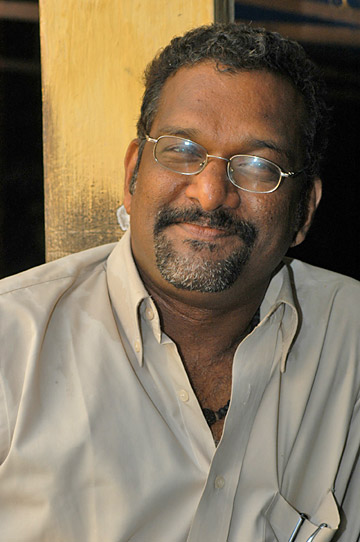Marking May as the “Short Story Month,” Words Without Borders highlights some of its stellar past publications, the Dagestani-Russian novelist Alisa Ganieva’s bitterly comic “A Village Feast” among them.

Rajeevan THACHOM POYIL writes in English and Malayalam, the language of the Indian state of Kerala, where he lives. In English, he has published Kannaki (Crux Publishers, Vermont, USA, 2003) and the collection He Who was Gone Thus (Yeti Books, Calicut, India, 2004). With the Croatian poet Lana Derkac he edited Third Word: Post Socialist Poetry (Monsoon Editions, Calicut, 2007). In Malayalam his publications include Vathil (The Door, 1991), Rashtratantram (Political Strategies, 2004) and Koritharichanal (The Day when I was Horripilated, 2005), in addition to a collection of literary and cultural essays, Athe Akasam and Athe Bhoomi (The Same Sky, The same Earth, 2001) and a travelogue, Purappettu Poya Vakku (On the Trial of the Lost Word, 2006). He has also edited an anthology of world poetry, Virunnuvanna Vakuu (The Guest Words). Presently he is working on a novel Undying Echoes of Silence.. A 2004 alumnus of the IWP, he held a Ledig House International Writer-in-Residence Fellowship in 2008.
IWP: What or whom do you read to recharge your writerly batteries?
RTP: Why doubt? It’s always the Indian classics, the Ramayana and the Mahabharata. Originally these works are in Sanskrit. But, Thunchat Ramanujan Ezuthchan, a seventeenth century Malayalam poet rendered them freely into Malayalam. The very word Ezuthchan, in Malayalam means the father of writing. And we consider him as the Father of our language, Malayalam. Sometimes, I go to Dostoyevsky, Tolstoy and Jorge Amado. Brothers Karamazov, Crime and Punishment, War and Peace, Anna Karenina and The Violent Land. My way is to open them closing my eyes and begin reading from the page that turns out as if from nowhere. It’s like a meditation. In poetry, I get charged from the vacana poets and Haiku.
IWP: What personal characteristic do you care most about in your life as a writer?
RTP: The undying disquiet that is always within, making me restless, sleepless, and fidgety. The reason and source of which remain unknown to me.
IWP: No matter what IWP organizes, writers seem to take away impressions of Iowa City that defy prediction. After all this time, is there something about your stay in the US that has remained particularly memorable?
RTP: Surely. Mainly it’s the writerly ambience. A writer can’t be lazy at Iowa because he or she is always in the community of writers, where all acts and talks finally end up in a talk bout the work one is doing. I don’t think this atmosphere is available anywhere in the world. The very ambience of Iowa leads a writer onto his or hers next work. There’s no way out but to write.
IWP: Is there music that complements or stimulates your writing?
RTP: Yes, this a brilliant question because I always write with a tune in the background and I follow this when I drive also. The background more or less keeps me undeviated on the road I am navigating along, be it in thought or in real act. Music is the spinal cord of all artistic works. I mean the music unpolluted by words.
IWP: What are you working on right now?
RTP: I am giving the final touch to my first novel.
IWP: What are the effects of the many digital and web-based literary activities in your region/language/literary circuits? Are you interested in, or affected by, these changes in the texture of language and modes of writing?
RTP: The advent of internet and web-based literary activities has helped a lot in democratizing literature. The print media is capital-based and therefore there’s hegemony in it. Now, anyone with a computer and an internet connection can launch a website or a blog. This is very positive. In that, it reminds me of the invention of printing which revolutionized and made people-oriented the process of writing. At the same time one has to be very critical and sensitive about the quality.
IWP: What writers, or what works, are in your opinion in need of more translation and attention? What literary neighborhood excites you at the present moment?
RTP: I can answer this question only by taking into consideration the writers who write in Indian regional languages like Hindi, Malayalam, Bengali, Tamil, etc, and comparing them with the Indian English writers. Take for example the Latin American writers or the Chinese writers. Their reputation is not because they write in English. We read the translation. But when it comes to India the Indian writers who are known outside Indian are only the ones who write in English, be it Arundhathi Roy, Vikram Seth or Amitav Gosh. I am not underestimating the quality of their works. But, at the same time, there are equally good, perhaps more outstanding writers in the regional languages, like Mahaswata Devi in Bengali, Asokamitran in Tamil and Uroob in Malayalam. I think there ought to be conscious initiative to translate such writers into English and other international languages.
IWP: From your vantage point, should the state be involved in supporting literary creativity or literary institutions, and if so, in what ways?
RTP: I don’t think so. When there’s a state, there’s a power. The position of a writer is always oppositional. When the state interferes, its policy and ideology come into play.
IWP: What—if anything--mdash; has given you a cause for political optimism in the last decade?
RTP: The survival of democracy all over the world.
Find Us Online